|
|
|
Sort Order |
|
|
|
Items / Page
|
|
|
|
|
|
|
| Srl | Item |
| 1 |
ID:
128206
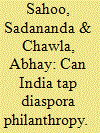

|
|
|
|
|
| Publication |
2014.
|
| Summary/Abstract |
International migration and diaspora has been one of the integral parts of the recent development discourse in academics as well as the policy domain, especially in the context of developing countries. Diaspora is seen as one of the emerging development actors as diaspora is perceived as creating economic, social and political capital through global network (Gaillard 1991, Meyer Brown 1999). Multilateral organizations have taken note of the significance of diasporic contribution towards the global development.
|
|
|
|
|
|
|
|
|
|
|
|
|
|
|
|
| 2 |
ID:
124976


|
|
|
|
|
| Publication |
2013.
|
| Summary/Abstract |
Existing studies of intergovernmental organizations (IGOs) and militarized conflict focus on dyadic counts of shared IGO membership. However, dyadic approaches are inconsistent with the basic properties of IGOs. Because IGOs are multilateral organizations, shared membership necessarily involves ties to third parties. This article employs network analytics to develop a novel explanation of how third-party IGO ties reduce militarized conflict. The analysis first examines the 'structural similarity' of states, defined by the extent to which states share similar patterns of IGO membership with relevant third parties. High levels of structural similarity indicate that states interact with a common set of IGO collaborators. The analysis then shows that micro-level changes in IGO membership effect changes in structural similarity, leading to the macro-level phenomenon of 'network convergence,' wherein states increasingly collaborate with the same third parties over time. Substantively, convergence results in increased overlap and integration between states' respective local networks of IGO partners. Because network convergence is costly, involving a combination of IGO-based accession, sovereignty, and alignment costs, it is unlikely to be pursued by purely exploitative state types. Consequently, convergence provides cooperative types with a mechanism for signaling a preference for cooperation over conflict. These credible signals in turn establish mutual trust among cooperators and effectively reduce the risk of militarized conflict. Extensive empirical analysis shows that, in fact, network convergence strongly correlates with a decline in militarized dispute initiations. The more that states collaborate with one another's IGO partners, the less likely they are to fight.
|
|
|
|
|
|
|
|
|
|
|
|
|
|
|
|
| 3 |
ID:
164368
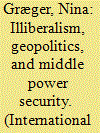

|
|
|
|
|
| Summary/Abstract |
Middle powers have played a key role in supporting global governance, a rules-based order, and human rights norms. Apart from conveying and effectuating global solidarity and responsibility, multilateral cooperation has been an arena where middle powers seek protection and leverage relatively modest power to greater effect, sometimes as “helpful fixers” to great powers. This article argues that geopolitical revival and the contestation of the liberal order are challenging middle powers' traditional sheltering policies, based on empirical evidence from the Norwegian case. First, the weakening of multilateral organizations is making middle powers more vulnerable to great power rivalry and geopolitics, and Norway's relationship with Russia is particularly pointed. Second, existing shelters such as NATO and bilateral cooperation with the US are negatively affected by the latter's anti-liberal foreign policies, making looser sheltering frameworks important supplements. While Norway's and other middle powers' traditional policies within the “soft power” belt may continue, “doing good” may become less prioritized, due to the need for security.
|
|
|
|
|
|
|
|
|
|
|
|
|
|
|
|
| 4 |
ID:
092257
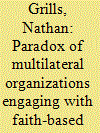

|
|
|
|
|
| Publication |
2009.
|
| Summary/Abstract |
Multilateral organizations, such as the World Health Organization, have traditionally not closely engaged with faith-based organizations. However, more recently, there has been a growing willingness among MOs to engage with FBOs. Factors promoting this engagement have included the rise of economic neoliberalism and participatory paradigms, a realization that FBOs may enhance program effectiveness, and a need for greater cooperation to respond to HIV/AIDS. At the same time, paradoxically, engagement with FBOs conflicts with the Enlightenment ideology on which most MOs are based. This ideology has traditionally espoused secularism and relegated faith to the private domain. To reconcile this paradox, MOs have often imposed conditions requiring FBOs to remove faith activities from their programs. This potentially compromises the unique cultural identity of the FBO.
|
|
|
|
|
|
|
|
|
|
|
|
|
|
|
|
| 5 |
ID:
130467
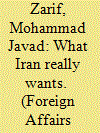

|
|
|
|
|
| Publication |
2014.
|
| Summary/Abstract |
Foreign policy is a critical component in the lives, conduct, and governance of all nation-states. But it has become even more significant in recent years as interstate relations have grown ever more complex. The inexorable rise in the number of international players -- including multilateral organizations, nonstate actors, and even individuals -- has further complicated policymaking. Meanwhile, the ongoing process of globalization -- however conceived and defined, whether lauded or despised -- has brought its inescapable weight to bear on the foreign policies of all states, whether large or small, developed or developing.
Since its establishment by a popular revolution in 1979, the Islamic Republic of Iran has grappled with these challenges. The postrevolutionary foreign policy of Iran has been based on a number of cherished ideals and objectives embedded in the country's constitution. These include the preservation of Iran's independence, territorial integrity, and national security and the achievement of long-term, sustainable national development. Beyond its borders, Iran seeks to enhance its regional and global stature; to promote its ideals, including Islamic democracy; to expand its bilateral and multilateral relations, particularly with neighboring Muslim-majority countries and nonaligned states; to reduce tensions and manage disagreements with other states; to foster peace and security at both the regional and the international levels through positive engagement; and to promote international understanding through dialogue and cultural interaction.
|
|
|
|
|
|
|
|
|
|
|
|
|
|
|
|
| 6 |
ID:
121881
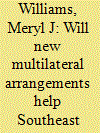

|
|
|
|
|
| Publication |
2013.
|
| Summary/Abstract |
Illegal cross-border fishing is an important maritime security issue in Southeast Asia. Southeast Asian states, along with other states with interests in the region, have created three new multilateral fisheries-relevant arrangements of agencies with overlapping but different memberships: the Regional Program of Action on Illegal, Unreported and Unregulated (IUU) Fishing; the ASEAN-Southeast Asia Fisheries Development Center Strategic Partnership; and the Coral Triangle Initiative. Each of these multilateral arrangements has the potential to help Southeast Asian states deal with fisheries-based security issues more effectively by building polycentric coalitions and capacity. So far, however, they have had a limited impact. This is partly because they are still principally technical support bodies rather than management organizations. In addition, states need to make greater strides towards settling outstanding border disputes and address fisheries overcapacity and overfishing in waters under their jurisdiction. States are unable to address these problems adequately because the fishery sector is typically low in national priority. Moreover, national interest in fisheries remains concentrated on immediate food and economic needs, and, in international relations, on jurisdictional rights.
|
|
|
|
|
|
|
|
|
|
|
|
|
|
|
|
|
|
|
|
|